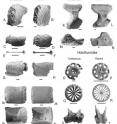New fossils suggest ancient origins of modern-day deep-sea animals
Related images
(click to enlarge)
A collection of fossil animals discovered off the coast of Florida suggests that present day deep-sea fauna like sea urchins, starfish and sea cucumbers may have evolved earlier than previously believed and survived periods of mass extinctions similar to those that wiped out the dinosaurs. The full results are published Oct. 10 in the open access journal PLOS ONE by Ben Thuy and colleagues from the University of Göttingen, Germany. Previously, researchers believed that these present-day animals evolved in the relatively recent past, following at least two periods of mass extinction caused by changes in their oceanic environment. The new fossil collection described in this study predates the oldest known records of the present-day fauna. "We were amazed to see that a 114 million year old deep-sea assemblage was so strikingly similar to the modern equivalents," says lead author Ben Thuy.
According to the authors, this evidence shows that the ancestors of modern deep-sea animals have lived in these deep waters for much longer than previously thought. That this collection of fossils appears to have survived several drastic changes in oceanic climates also suggests that deep-sea biodiversity may be more resilient than shallow-water life forms, and more resistant to extinction events than previously thought.
Source: Public Library of Science
Other sources
- New fossils suggest ancient origins of modern-day deep-sea animalsfrom Science DailyWed, 10 Oct 2012, 22:01:11 UTC
- New fossils suggest ancient origins of modern-day deep-sea animalsfrom PhysorgWed, 10 Oct 2012, 21:00:45 UTC
